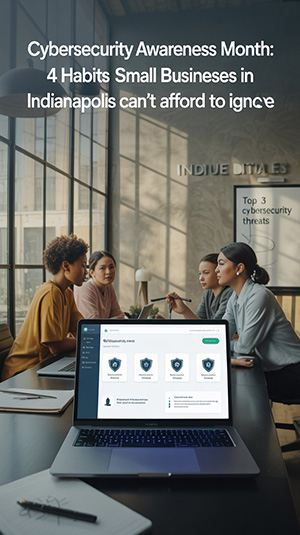 October is Cybersecurity Awareness Month, and for small businesses across Carmel and the greater Indianapolis area—especially healthcare practices, financial firms, and law offices—it’s a reminder that protecting your data isn’t optional.
October is Cybersecurity Awareness Month, and for small businesses across Carmel and the greater Indianapolis area—especially healthcare practices, financial firms, and law offices—it’s a reminder that protecting your data isn’t optional.
Here’s the truth: most cyberattacks don’t start with a sophisticated hacker. They start with a small mistake—a reused password, a skipped update, or an employee clicking the wrong link. For firms handling patient records, financial data, or confidential case files, those “small mistakes” can lead to HIPAA fines, lawsuits, or lost client trust.
The good news? A few daily cybersecurity habits can dramatically reduce your risk. Here are four areas every workplace should focus on:
1. Communication: Make Cybersecurity Part of Everyday Conversations
Security isn’t just an “IT issue.” It’s a team issue. Encourage open conversations about threats and safe practices:
- Add a two-minute phishing reminder in staff meetings.
- Share real-world scam alerts from your industry.
- Normalize asking, “Does this look suspicious?” before clicking.
When cybersecurity becomes part of your culture, it feels less like a burden and more like second nature.
2. Compliance: Protect Data, Protect Trust
Whether it’s HIPAA for healthcare, PCI for financial transactions, or confidentiality rules for legal files, compliance is more than red tape—it’s the foundation of client trust. Falling short can mean more than fines; it can mean reputational damage that lingers for years.
Best practices include:
- Reviewing and updating policies regularly.
- Keeping detailed records of staff training and system updates.
- Making compliance a shared responsibility, not just an IT checkbox.
3. Continuity: Plan for “What If” Scenarios
If ransomware locked your files tomorrow, how quickly could you get back to work? Business continuity means being prepared before disaster strikes:
- Automate and test your backups regularly.
- Have a recovery plan for downtime and ransomware incidents.
- Run simple drills—like restoring a single file—to prove your system works.
A strong continuity plan means less panic and faster recovery.
4. Culture: Your People Are the First Line of Defense
Technology can only go so far. A true security-first culture empowers employees to be proactive protectors:
- Require strong, unique passwords—or better, use password managers.
- Enforce multifactor authentication (MFA) everywhere possible.
- Recognize employees who flag phishing attempts.
When your people feel ownership of security, it becomes a team win.
Cybersecurity Awareness Month: A Call to Action
Cybersecurity isn’t about fear—it’s about resilience. By focusing on communication, compliance, continuity, and culture, small businesses can build stronger defenses without overwhelming staff.
If your Carmel or Indianapolis practice is ready to strengthen its cybersecurity posture, now is the perfect time to act. Don’t wait until a data breach, HIPAA audit, or missed court filing forces your hand.
👉 Schedule a free discovery call today and let’s build a cyber-smart culture that keeps your data safe, your operations running, and your reputation protected.


